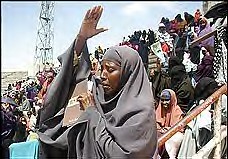The Horn of Africa nation Eritrea won a very dubious award
this week: the world’s most censored nation.
The list of the world’s 10 worst countries was put together by the Committee to
Protect Journalists and Eritrea fought off the tough competition of North
Korea, Syria, Iran, Equatorial Guinea, Uzbekistan, Burma, Saudi Arabia, Cuba
and Belarus to win this uncoveted award.
The CPJ research is based on 15 benchmarks, including blocking of
websites; restrictions on electronic recording and dissemination; the absence
of privately owned or independent media; and restrictions on journalist
movements.
Eritrea has allowed no foreign journalists in since 2007 and
domestic media are tightly controlled. Eritrea has been a
dictatorship for 20 years since it achieved independence in a bloody war
with Ethiopia. All domestic media are
controlled by the government and the Orwellian "Ministry of Information" direct
every detail of coverage. CPJ quoted an exiled journalist who said every time
they had a story it was the Ministry who arranged interview subjects and gave
instructions on the news angle to follow. Eight journalists from Eritrea are on
CPJ's Journalist Assistance Program which supports exiled journalists who cannot be helped by advocacy alone.
 Not surprisingly, the country’s president Isaias Afewerki
who has ruled since independence in 1993, dominates coverage. Equally unsurprising, the coverage is
universally positive. As with all secretive countries, the media chose silence as a way of dealing with bad news. When Afewerki had a health scare recently it reported
nothing for several weeks. Intense rumour-mongering filled the vacuum. Opposition websites and social media commented
on the fact president had not appeared on television for nearly a month and
many speculated on whether he had died. (photo of Afewerki: Geert Vanden Wijngaert/AP)
Not surprisingly, the country’s president Isaias Afewerki
who has ruled since independence in 1993, dominates coverage. Equally unsurprising, the coverage is
universally positive. As with all secretive countries, the media chose silence as a way of dealing with bad news. When Afewerki had a health scare recently it reported
nothing for several weeks. Intense rumour-mongering filled the vacuum. Opposition websites and social media commented
on the fact president had not appeared on television for nearly a month and
many speculated on whether he had died. (photo of Afewerki: Geert Vanden Wijngaert/AP)
Finally on 29 April, Information Minister Ali Abdu told the BBC
he saw Afewerki every day and the 66-year-old president was “in robust health.”
A day later Afewerki went on television to dispel the rumours. "I do not have any kind of sickness," he said and accused those
peddling such rumours of being "sick" and said they were indulging in
psychological warfare to "disturb" the people.
The real psychological warfare is being conducted by the government suspicious of its own people. Government spies routinely report opinions in the street and even intimidate their opponents abroad. All Internet service providers are required to connect to the web through government-operated EriTel. While Eritrea's journalists in exile run diaspora websites from London, Houston and Toronto, domestic Internet access is only affordable for the government elite. In 2011 the country had plans to implement mobile Internet capability but as the social media impact on the Arab Spring became widely known, Afewerki’s government abandoned the idea.
The real psychological warfare is being conducted by the government suspicious of its own people. Government spies routinely report opinions in the street and even intimidate their opponents abroad. All Internet service providers are required to connect to the web through government-operated EriTel. While Eritrea's journalists in exile run diaspora websites from London, Houston and Toronto, domestic Internet access is only affordable for the government elite. In 2011 the country had plans to implement mobile Internet capability but as the social media impact on the Arab Spring became widely known, Afewerki’s government abandoned the idea.
The Eritrean Government has become increasingly paranoid as the
country slowly becomes an international pariah. The UN Security Council imposed sanctions on Eritrea in 2009 for its support of Al
Shabaab and other insurgents fighting neighbouring Somalia’s transitional
government. The UN resolution also
referenced a longstanding border dispute between Eritrea and Djibouti and demanded
Eritrea cease “arming, training, and equipping armed groups that aim to
destabilize the region or incite violence and civil strife in Djibouti.”
Eritrea’s friendlessness has allowed another longstanding
enemy make incursions into its territory. In March, the Guardian reported Ethiopia had attacked Eritrea for
the first time in a decade with few repercussions. Ethiopia's forces carried out a dawn raid in
what it called a successful attack against military targets. Ethiopia claimed Eritrea used the military base
to train an Ethiopian rebel group which has killed foreigners in Afar.
The Guardian put the lack of international attention to the
border incursion down to Afewerki's poor reputation, “a piece of work” as the British broadsheet called him. It quoted a Wikileak cable by US ambassador to Eritrea, Ronald
McMullen, which said Afewerki was an unhinged dictator and his regime was very good at controlling all
aspects of Eritrean society.
Media censorship is a key part of that control and the reason why the “award” for the most censored country is not as frivolous as it sounds. As far back as 2005 Reporters Without Borders described Eritrea as a “black hole for news”. Seven years later nothing has yet emerged from Afewerki’s vortex. And as the San Francisco Chronicle says, no one cares.
Media censorship is a key part of that control and the reason why the “award” for the most censored country is not as frivolous as it sounds. As far back as 2005 Reporters Without Borders described Eritrea as a “black hole for news”. Seven years later nothing has yet emerged from Afewerki’s vortex. And as the San Francisco Chronicle says, no one cares.















